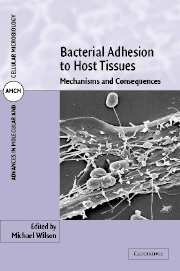Preface
Published online by Cambridge University Press: 08 October 2009
Summary
Except when in utero, every human being is colonized by approximately 1014 microbes (mainly bacteria) that constitute the normal microflora. Apart from those organisms that are present in the lumen of the intestinal tract, all of these microbes maintain an association with their host by adhering to some cell, tissue or secretion. It is increasingly being realized that not only is this normal microflora beneficial to its host (e.g. by providing vitamins and protection from exogenous pathogens) but it is, indeed, essential for the host's proper development, for example in the differentiation and maturation of the intestinal tract, immune system, etc. A knowledge of how members of the normal microflora adhere to their host is, therefore, important in understanding the mutualistic association we know as Homo sapiens.
Adhesion of a pathogenic organism to its host is also the first stage in any infectious disease and this truism provides another justification for studying bacterial adhesion. Interest in this aspect of bacterial virulence is increasing rapidly as our armamentarium of antibiotics dwindles in effectiveness owing to the development of resistance in major pathogens. It is believed (and strongly hoped) that research into bacterial adhesion mechanisms will identify new targets for therapeutic intervention.
This book is intended to update the reader in key areas of research in the field of bacterial adhesion to host cells and tissues. It is divided into three parts that deal with: (I) the mechanisms underlying the adhesion of bacteria to host structures, (II) the effect that adhesion to host cells has on bacteria and (III) the consequences for the host cell (or tissue) of bacterial adhesion.
- Type
- Chapter
- Information
- Bacterial Adhesion to Host TissuesMechanisms and Consequences, pp. xv - xviPublisher: Cambridge University PressPrint publication year: 2002

